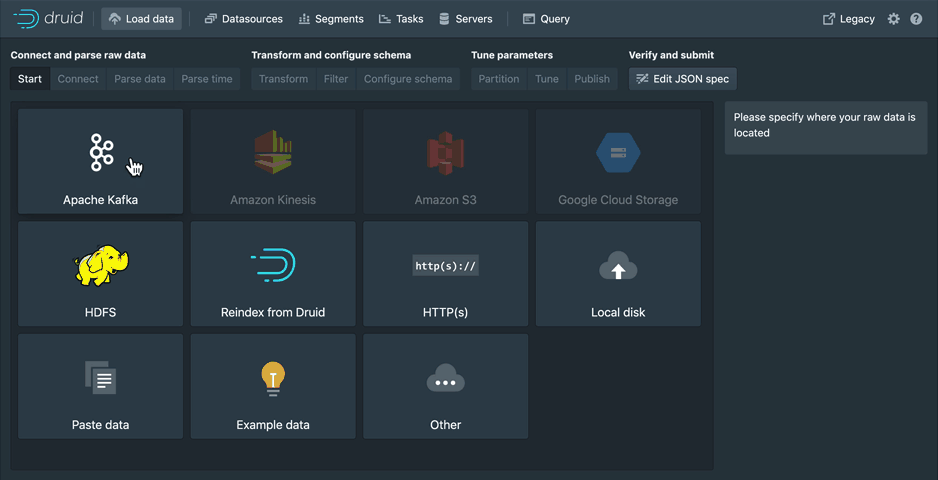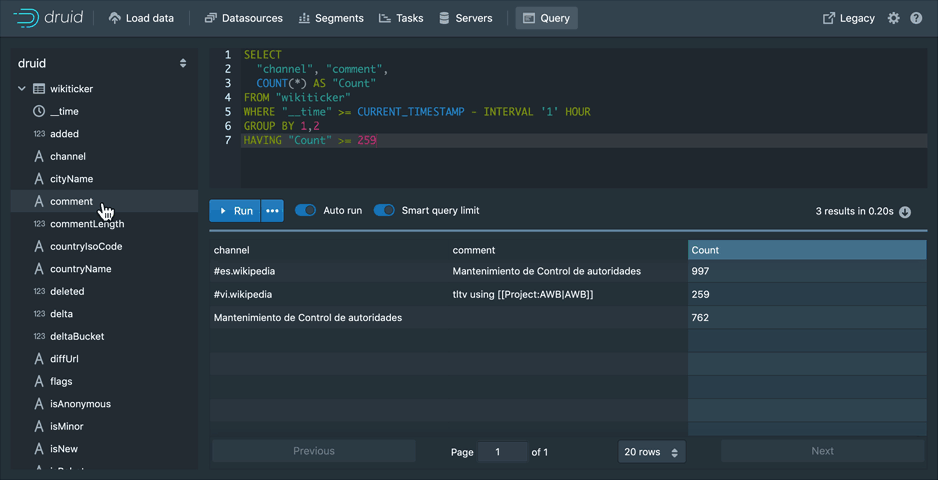* Refactoring codes around ingestion: - Parallel index task and simple task now use the same segment allocator implementation. This is reusable for the future implementation as well. - Added PartitionAnalysis to store the analysis of the partitioning - Move some util methods to SegmentLockHelper and rename it to TaskLockHelper * fix build * fix SingleDimensionShardSpecFactory * optimize SingledimensionShardSpecFactory * fix test * shard spec builder * import order * shardSpecBuilder -> partialShardSpec * build -> complete * fix comment; add unit tests for partitionBoundaries * add more tests and fix javadoc * fix toString(); add serde tests for HashBasedNumberedPartialShardSpec and SegmentAllocateAction * fix test * add equality test for hash and range partial shard specs
Website | Documentation | Developer Mailing List | User Mailing List | Slack | Twitter | Download
Apache Druid
Druid is a high performance real-time analytics database. Druid's main value add is to reduce time to insight and action.
Druid is designed for workflows where fast queries and ingest really matter. Druid excels at powering UIs, running operational (ad-hoc) queries, or handling high concurrency. Consider Druid as an open source alternative to data warehouses for a variety of use cases.
Getting started
You can get started with Druid with our quickstart.
Druid provides a rich set of APIs (via HTTP and JDBC) for loading, managing, and querying your data. You can also interact with Druid via the built-in console (shown below).
Load data
Load streaming and batch data using a point-and-click wizard to guide you through ingestion setup. Monitor one off tasks and ingestion supervisors.
Manage the cluster
Manage your cluster with ease. Get a view of your datasources, segments, ingestion tasks, and services from one convenient location. All powered by SQL systems tables, allowing you to see the underlying query for each view.
Issue queries
Use the built-in query workbench to prototype DruidSQL and native queries or connect one of the many tools that help you make the most out of Druid.
Documentation
You can find the documentation for the latest Druid release on the project website.
If you would like to contribute documentation, please do so under
/docs in this repository and submit a pull request.
Community
Community support is available on the druid-user mailing list, which is hosted at Google Groups.
Development discussions occur on dev@druid.apache.org, which you can subscribe to by emailing dev-subscribe@druid.apache.org.
Chat with Druid committers and users in real-time on the #druid channel in the Apache Slack team. Please use this invitation link to join the ASF Slack, and once joined, go into the #druid channel.
Building from source
Please note that JDK 8 is required to build Druid.
For instructions on building Druid from source, see docs/development/build.md
Contributing
Please follow the community guidelines for contributing.
For instructions on setting up IntelliJ dev/intellij-setup.md






